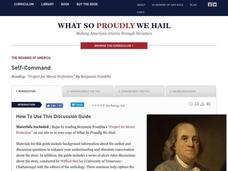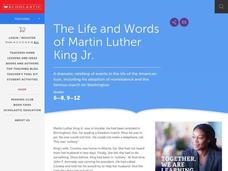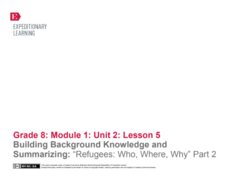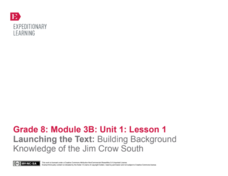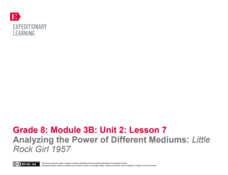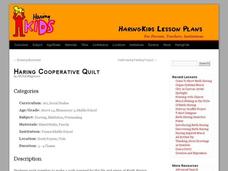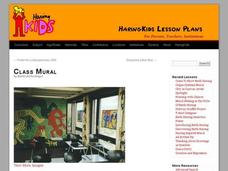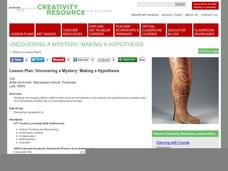K12 Reader
What is a Tribal Government?
What is life like on a Native American reservation? Learn about the ways a tribal government works with a reading comprehension activity. After reading a short passage, kids use context clues to answer five comprehension questions.
Dick Blick
Mardi-Gras Mask
Celebrate Mardi Gras in style with beautiful sparkling masks! Class members use provided materials to create their own Mardi Gras masks and then don their costumes for a fun masquerade.
Curated OER
What Is Clay?
This resource could come in handy the next time you feel like teaching about clay. Basic sculpting techniques, vocabulary, and history of clay are outlined in this informative resource. Use prior to teaching an art project involving...
K12 Reader
Civil Rights Biography: Dr. Martin Luther King, Jr.
Introduce your class to Dr. Martin Luther King, Jr. and his many accomplishments through a one-page biography. Class members read the text and respond to three questions included at the end.
K12 Reader
Civil Rights Biography: Rosa Parks
Add to your instruction on the civil rights movement with this biography of Rosa Parks. Class members read the one-page summary of her life, which focuses mainly on the part she played in the bus boycott. After reading, pupils respond to...
Wordly Wise 3000 Online
Viva Cinco de Mayo
Many people think Cinco de Mayo is the celebration Mexican independence, but they're incorrect. Learn about the battle of Puebla and the victory of General Zaragoza with a short reading passage that includes comprehension and vocabulary...
What So Proudly We Hail
The Meaning of America: Self-Command
Even for one of the most accomplished men in American history, there was room for improvement. Challenge high schoolers to use Benjamin Franklin's Project for Moral Perfection to analyze text, make inferences, connect to historical...
Classics for Kids
Composers Timeline
Take a quick tour through the last 350 years of music composition with an interactive timeline tool. As learners scroll through the years, they see which composers were born and working during the Baroque, Classical, Romantic, and Modern...
Mrs. Robbins' Social Studies Site
The Berlin Blockade
The Berlin Blockade may not take up as much space in the history books as other events of the Cold War, but for the citizens of west Berlin in 1948—and the events to follow between the Soviet Union and the United Stattes—those 318 days...
Shakespeare Globe Trust
Fact Sheet: Audiences
In Shakespeare's time, people could attend a play at the local theatre for as little as one penny. Using an informative handout, scholars learn about the typical London audience member during the 1600s. Readers explore how theatre...
Smithsonian Institution
Braiding Rhythms: The Role of Bell Patterns in West African and Afro-Caribbean Music
Africans transported to the Caribbean as part of the transatlantic slave trade brought with them a rich tradition of music and dance. Four lessons teach young musicians the rumba clave rhythm, cascara rhythm, and the 6/8 bell patterns...
Scholastic
The Life and Words of Martin Luther King, Jr.
Here is a precise article explaining chronological events that led Martin Luther King, Jr. to march for freedom and civil rights.
EngageNY
Grade 10 ELA Module 1: Unit 2, Lesson 6
Is history "little more than a relic," as one of the characters in "The Palace Thief" contends? Has Hundert's love of antiquity kept him from changing with the times? Readers consider how the author uses these conflicting views to...
Ziptales
The Pied Piper of Hamelin: The Mystery of the Children of Hamelin
Which is more likely: 130 children followed a magical piper out of Hamelin and disappeared forever, or that they died of the plague? Or could they have escaped from Hamelin via a secret tunnel to Transylvania? Learners investigate...
EngageNY
Building Background Knowledge and Summarizing: “Refugees: Who, Where, Why” Part 2
What are some universal aspects of refugees' experiences worldwide and throughout history? Scholars read the text "Refugees: Who, Where, Why" and create two class anchor charts. Finally, they each write a paragraph that provides an...
EngageNY
Launching the Text: Building Background Knowledge of the Jim Crow South
Pictures and photographs help build background knowledge about a topic. Scholars participate in a gallery walk to learn more about the Jim Crow era of US history and the desegregation of schools following Brown v. Board of Education....
EngageNY
Close Reading: Understanding Carlotta’s Journey
How do incidents in A Mighty Long Way provoke the author, Carlotta Walls LaNier, to make certain decisions that shape her story? Scholars engage in a close reading of the memoir, analyzing events in US history and Carlotta's personal...
EngageNY
Analyzing the Power of Different Mediums: Little Rock Girl 1957
Scholars begin the instructional activity by watching a video of media history and discussing it in a Turn and Talk. They then look at the texts A Mighty Long Way and Little Rock Girl 1957 to make a connection to the role of the press in...
Curated OER
Haring Cooperative Quilt
Students inspect visual arts by examining images on the web. In this art history lesson, students discuss the history of art after researching Keith Haring's work on the Internet. Students analyze the style of Haring and create a quilt...
Curated OER
Look Before You Think: How To Appreciate a Painting
Learners develop an elementary understanding of the history of art. They study the basic elements of a painting including perspective, composition, color, light and symbolism. They look at each selected painting and analyze it, moving...
Curated OER
Class Mural
Students discover visual arts by examining a wall mural. In this art appreciation lesson, students discuss the history of art after researching information on the Internet. Students view famous paintings which feature physical movement...
Curated OER
Art as Therapy
Students explore how they connect with artwork on an emotional level through writing and the creation of an original piece of art.
Curated OER
Lesson: Uncovering a Mystery: Making a Hypothesis
The class is presented with an image of a hand-carved leg. They act as art historians and hypothesize as to the purpose, nature, and creators of this amazing wooden leg. They compose journal entries from the point of view of an art...
Curated OER
Traditions and Languages of Three Native Cultures: Tlingit, Lakota, and Cherokee
Young scholars explore the connections between tradition and language. They examine the environment, history and culture of the Tlingit, Lakota and Cherokee tribes and identify the importance of maintaining languages for oral traditions.








